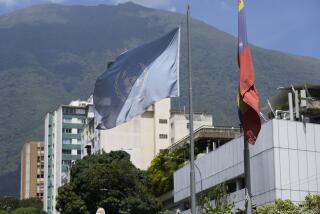At OAS meeting, an attack on freedom of expression
- Share via
The Organization of American States finishes up its annual meeting in Bolivia on Tuesday. The normally humdrum assembly of 35 nations is turning out to be one of the most controversial gatherings in years, thanks to an effort by a handful of countries to weaken one of the OAS’ most important and autonomous bodies: the Inter-American Commission on Human Rights.
Those efforts began early this year when Ecuador’s president, Rafael Correa, sought to prevent the commission’s special rapporteur for freedom of expression from doing her job effectively. Correa, who has been at war with the media in his own country, proposed measures that would have prevented publication of an OAS report on the status of freedom of expression in every country in the hemisphere. That report has been put out annually for more than a decade by the Office of the Special Rapporteur. Correa’s plan also called for expanding state control over the work of special rapporteurs.
It’s no mystery why Correa and a handful of others want to undercut the commission’s influence. The organization is an independent watchdog that has effectively used its influence in the region to draw attention to human rights abuses and protect individuals, journalists and groups who face serious dangers. Correa, along with Bolivia’s Evo Morales and Venezuela’s Hugo Chavez, consider the commission’s attempts to protects citizens an intrusion. That’s nonsense.
What’s surprising is that OAS Secretary General Jose Miguel Insulza has joined in those efforts. Insulza has presented his own plan that would allow the member states to revise the commission’s rules and statutes. The statues have not been tinkered with in decades. No doubt, Correa and others who oppose the independent commission’s work on human rights will use the invitation to set new rules that curtail the commission’s effectiveness by eliminating its ability to issue protective orders used to help individuals or groups in emergency situations.
Neither plan is good news for the OAS or for the hemisphere. The Inter-American Commission on Human Rights is effective because it’s independent, but that is now in jeopardy.
ALSO:
More to Read
A cure for the common opinion
Get thought-provoking perspectives with our weekly newsletter.
You may occasionally receive promotional content from the Los Angeles Times.






